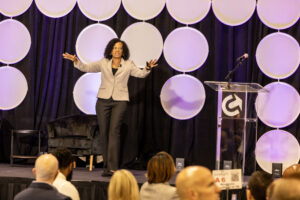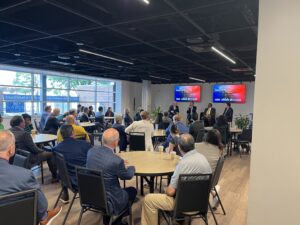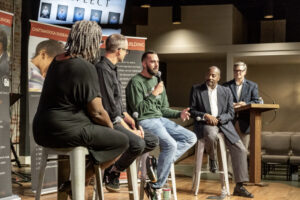This year, Chattanooga Area Chamber of Commerce hosted the Association of Chamber of Commerce Executives (ACCE) Government Relations Division Roundtable Meeting. The two-day event brought government relations representatives from 22 chambers across the country to Chattanooga in the hopes of fostering collaboration between cities. Chamber professionals came from nearby metros like Nashville, Tennessee and Greenville, South Carolina, as well as larger metros like Philadelphia and Washington. ACCE chose to hold the roundtable meeting in Chattanooga based on feedback from previous years.
“It was a real honor to get to host colleagues from around the country in Chattanooga. The two days were filled with great idea sharing, best practices and building our relationships with each other. It’s a unique time in our industry and in civic engagement and discourse. This group allows us to learn from each other how to best advocate for our members and the business community in our own areas of the country,” said Justin Groenert, Vice President of Public Policy, Chattanooga Chamber.
The opening day began with a breakfast meeting inside the INCubator at the Hamilton County Business Development Center. Chattanooga Chamber representatives in attendance included Christy Gillenwater, CCE, IOM, President & CEO; Bill Lupia, Director of Small Business and Entrepreneurship, the INCubator; and Groenert as well. Gillenwater and Groenert welcomed everyone alongside Will Burns, Vice President of Communications & Networks, ACCE.
After the welcome, Groenert sat down for an interview with former Chattanooga mayor, Sen. Bob Corker to learn about his rise in politics and his efforts to revitalize Downtown Chattanooga while in office. Corker spoke on his role in restoring the riverfront and his inspiration for turning Chattanooga into a hub for outdoor issues.
“The most rewarding thing that I did in public service was being the mayor of a midsize city. There’s nothing quite like it,” said Corker.
The mayor ended his discussion by speaking about the responsibility of civil leadership in politics and his vision for the entrepreneurial spirit of Chattanooga.
“Every city has a light, just like human beings. We’re at a place right now to capture the best of all the things that have happened in our community and really move ahead,” said Corker.
After the meeting, representatives were given the opportunity to explore Downtown Chattanooga through a walking tour presented by Jim Williamson, Vice President, Planning & Development, River City Company. The day ended with a dinner at Feed Co. Table & Tavern, sponsored by Tennessee American Water.
The second day’s roundtable discussions were held at the Chattanooga Chamber of Commerce. Topics included political candidate endorsements through PAC organization, issue advocacy and ballot initiatives, as well as staff policies for political activity. Chamber representatives shared their policies for direct political action as well as their experiences endorsing candidates. Other representatives shared their policies of sustaining from direct political action and instead driving political influence through special committees, board members or private citizens.
Chamber representatives spoke on guiding candidates seeking reelection through candidate schools where they would hone skills related to public speaking and debates. The conversation also included practices for guiding newly elected officials through their onboarding process and conducting exit interviews for elected officials leaving office. Chamber members also shared their objectives to build relationships across party lines to better serve the community.
A critical point in the discussion came when talking through the chamber’s role in balancing corporate, political and social justice interests. Representatives debated whether businesses should engage in social justice issues and how to better support equity outcomes while maintaining the status quo for their residents. As a response to this issue, the Chattanooga Chamber of Commerce recently passed the CEO Pledge for Racial Equality that aims to ensure more opportunities for inclusive growth in Chattanooga and Hamilton County.
The conversation also included initiatives to close generational wealth gaps and draw in younger audiences looking for work. One representative made the point that younger audiences look to where they live before finding work. Our Chamber aims to leverage this growing trend as Chattanooga continues to be one of the best places for remote work and home to some of the best jobs in Tennessee.
Learn more about ACCE by visiting their website, here.










